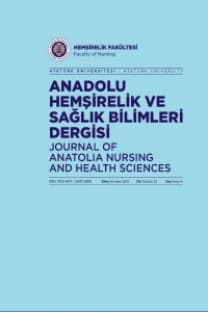KEMOTERAPİ ALAN MEME KANSERLİ HASTALARDA PROGRESİF GEVŞEME EGZERSİZLERİNİN UYKU KALİTESİ VE AĞRIYA ETKİSİ
Gevşeme egzersizleri; uyku kalitesi;; ağrı.
___
- Ağargün Y, Kara H, Anlar O. Pittsburgh Uyku Kalitesi İndeksi’nin Geçerliği ve Güvenirliği. Türk Psikiyatri Dergisi 1996; 7 (2): 102–15.
- Ancoli-Israel S, Moore PJ., Jones V. The Relationship Between Fatigue and Sleep İn Cancer Patients: a Review. Eur J Cancer Care 2001; 10 (4): 245Anderson KO, Cohen MZ, Mendoza TR, Guo, H, Harle MT, Cleeland CS. Brief Cognitive-Behavioral
- Audiotape İnterventions for Cancer-Related Pain: Immediate but Not Long-Term Effectiveness. Cancer 2006; 107 (1): 207-14.
- Berger AM, VonEssen S, Kuhn BR. Feasibility of a Sleep İntervention During Adjuvant Breast Cancer Chemotherapy. Oncol Nurs Forum 2002; 29(10): 1431Carpenter JS, Elam JL,Ridner SH, Carney PH, Cherry GJ, Cucullu HL. Sleep, Fatique and Depressive Symptoms in Breast Cancer Survivors and Matchod Healty Women Experiencing Hot Flashes.
- Oncol Nurs Forum 2004; 31(3): 591-10.
- Demiralp M, Oflaz F, Komurcu S. Effects of Relaxation Training on Sleep Quality and Fatigue in Patients ith Breast Cancer Undergoing Adjuvant Chemotherapy. J Clin Nurs 2010 ;19(7-8): 1073-83.
- Hansen MV, Madsen MT, Hageman I, Rasmussen LS, Bokmand S, Rosenberg J et al. The Effect of Melatonin on Depression, Anxiety, Cognitive Function and Sleep Disturbances in Patients with Breast Cancer. The Melody Trial: Protocol for a Randomised, Placebo-Controlled, Double-Blinded Trial. BMJ Open 2012; 2(1): 1-9
- Karanlık H, Özmen V, Asoğlu O, İğci A, Keçer M, Tuzlalı S, Müslümanoğlu M, Aslay I, Topuz E. Meme Kanseri Cerrahi Tedavisinin Uzun Dönem Sonuçları. Meme Sağlığı Dergisi 2006;;2(2) : 89-95.
- Koopman C, Nouriani B, Erickson V, Anupindi R, Butler LD, Bachmann MH et al. Sleep Disturbances in Women with Metastatic Breast Cancer, The Breast J. 2002; 8(6): 362-70.
- Kristjanson LJ, Ashcroft T. The Family’s Cancer Journey: A Literature Review. Cancer Nurs, 1994; 17(1): 1-17.
- Kwekkeboom K, Wanta M. Bumpus Patients’ Perceptions of the Effectiveness of Guided İmagery and Progressive Muscle Relaxation İnterventions Used for Cancer Pain. Complementary Ther Clin Pract 2008; 14 (3): 185–94.
- Liu L, Rissling M, Natarajan L, Fiorentino L, Mills PJ, Dimsdale JE et al. The Longitudinal Relationship Between Fatigue and Sleep in Breast Cancer Patients Undergoing Chemotherapy. Sleep 2012; 35(2): 237-45.
- McMillan SC, Tittle M, Hagan S, Laughlin J. Management of Pain and Pain-Related Symptoms in Hospitalized Veterans with Cancer. Cancer Nurs 2000; 23(5): 327–36.
- McNeill JA, Sherwood GD, Stark PL, Thompson CJ. Assessing Clinical Outcomes: Patient Satisfaction with Pain Management. J Pain Symptom Manage 1998;16(1):29–40.
- Mundy EA, DuHamel KN, Montogery GH. The Efficacy of Behavioral İnterventions for Cancer Treatment-Related Side Effects. Semin Clin Neuropsychiatry 2003;8(4):253–75.
- Mystakitao K, Parpa E, Tsilika E, Pathiaki M, Gennatas K, Smyrniotis V et al. The Relationship of Subjective Sleep Quality, Pain, and Quality of Life in Advanced Cancer Patients. Sleep 2007; 30(6): 737-42. Özbaş A. Meme Kanserli Ailelerde Sorunlar ve Çözümler. Meme Sağlığı Dergisi 2006;; 2(3): 115-7.
- Özmen V. Türkiye'de Meme Kanseri. Türkiye Klinikleri J Gen Surg-Special Topics 2013; 6(2): 1-6
- Öztekin D. Meme Kanserinde Tanı ve Tedavi Sürecinde Karşılaşılan Sorunlarla Mücadele Yolları. Meme Sağlığı Dergisi 2006;; 2(2) :67–70.
- Özveren H. Ağrı Kontrolünde Farmakolojik Olmayan Yöntemler. Hacettepe Üniversitesi Sağlık Bilimleri Fakültesi Hemşirelik Dergisi 2011;; 18 (1): 83-92.
- Rabin C, Pinto B, Dunsiger S, Nash J, Trask P. Exercise and Relaxation İntervention for Breast Cancer Survivors: Feasibility, Acceptability and Effects. Psychooncology 2009; 18(3): 258-66.
- Roffe L, Schmidt K, Ernst E. A Systematic Review of Guided İmagery as an Adjuvant Cancer Therapy. Psychooncology 2005;14(8): 607–17.
- Simeit R, Deck R, Conta-Marx B. Sleep Management Training for Cancer Patients with İnsomnia. Support Care Cancer 2004;; 12 (3): 176–83.
- Vainio A, Auvinen A. Prevalence of Symptoms among Patients with Advanced Cancer: An İnternational Collaborative Study. Symptom Prevalence Group. J Pain Symptom Manage 1996; 12 (1): 3–10
- Van Fleet S. Relaxation and İmagery for Symptom Management: İmproving Patient Assessment and İndividualizing Treatment. Oncol Nurs Forum 2000; 27(3): 501-10.
- Wells N. Pain İntensity and Pain İnterference in Hospitalized Patients with Cancer. Oncol Nurs Forum 2000; 27 (6): 985–91.
- Williams S, Schreier AM. The Effect of Education in Managing Side Effects in Women Receiving Chemotherapy for Treatment of Breast Cancer, Oncol Nurs Forum, 2004; 31(1): 16-23 .
- Yung Paul MB, Fung MY, Chan Tony MF, Lau Bernard WK. Relaxation Training Methods for Nurse Managers in Hong Kong: A Controlled Study. Int J Ment Health Nurs 2004; 13(4): 255-61.
- ISSN: 1309-5471
- Yayın Aralığı: Yılda 4 Sayı
- Yayıncı: Atatürk Üniversitesi Hemşirelik Fakültesi
HEMŞİRELİK ÖĞRENCİLERİNİN ÜSTBİLİŞ DÜZEYLERİNİN ÇEŞİTLİ DEĞİŞKENLER AÇISINDAN İNCELENMESİ
Feyza NAZİK, Mehtap SÖNMEZ, Gülsen GÜNEŞ
BASINÇ YARASI GELİŞİMİNDE PERFÜZYON DEĞERLERİNİN ETKİSİ
Elçin ÜLKER EFTELİ, Ülkü GÜNEŞ
Evşen NAZİK, Gürsel ÖZTUNÇ, Berksoy ŞAHİN
ERGENLERİN SAĞLIKLI YAŞAM BİÇİMİ DAVRANIŞLARININ DEĞERLENDİRİLMESİ
Meltem KARADAMAR, Rana YİĞİT, Mehmet Ali SUNGUR
HEMŞİRELERİN PROFESYONEL TUTUMLARI İLE BUNU ETKİLEYEN FAKTÖRLERİN İNCELENMESİ
Yurdanur DİKMEN, Melike YÖNDER, Songül YORGUN, Yasemin YILDIRIM USTA, Sema UMUR, Aynur AYTEKİN
DOĞUM EYLEMİNDE BEL AĞRISININ HAFİFLETİLMESİNDE İNTRADERMAL STERİL SU ENJEKSİYONU
GEÇERLİK VE GÜVENİRLİK ÇALIŞMALARINDA DOĞRULAYICI FAKTÖR ANALİZİNİN KULLANIMI
ANNELERİN DOĞUM SONU YAŞAM KALİTESİNİN BELİRLENMESİ
Asli SİS ÇELİK, Nihan TÜRKOĞLU, Türkan PASİNLİOĞLU
MEDYANIN KADIN ESTETİĞİ ÜZERİNE ETKİLERİ VE EBENİN ROLÜ
